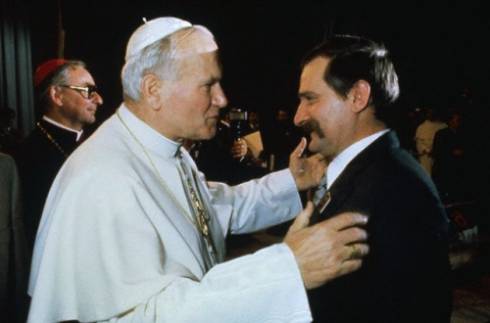
John Paul II and Lech Walesa, January 15, 1981
Washington Post columnist Marc Fisher offers a corrective in Slate to some of the inflated claims of the role of Pope John Paul II in the collapse of communism in Europe. Although claiming to see the bigger picture, the piece is remarkably myopic. Fisher draws entirely on the experience of the people of Germany, who smashed down their wall. As he writes, “No one I spoke to in Leipzig that night mentioned the pope.”
I always asked: Why are you doing this? And the answers came in a torrent, as if decades of silence had been unplugged. Especially in East Germany, where almost everyone could watch West German TV (though they had to keep the volume way down because it was strictly verboten to watch, and if the neighbor heard, there could be trouble), people talked about their jealousy for the material goods that Westerners enjoyed–the clothes, the shoes, the cars, the food. They talked about their dreams of traveling outside the Soviet Bloc and about the hopes–mainly for a particular career or area of study–they’d had when they were young. And they talked about the freedom to say what they wanted or to teach their children about realities other than what the socialist state had ordained.
Many people showed remarkable courage, as well as an intuitive grasp of complex issues in game theory. After all, the most important chant in Leipzig and Dresden was not “Kommunisten ‘raus!” (“Communists Out!”) but “Auf die Strasse!” (“Onto the street!”). They knew that the more people who could be mobilized to join the protests, the lower the chance that any one of them would be punished, and the greater the chance (as well as the chants) that yet more would join.
But …. it was events in Poland that showed that one could stand up to the Communists, that there were a lot more of “us” than there were of “them.” No one can reasonably deny the impact of the Catholic Church in Poland in demonstrating the hollowness of the People’s State. The impact was systemic and was felt, indirectly to be sure, in virtually everything that followed. (And we shouldn’t forget the influence of the Hungarians, who pressured their government to allow the East Germans who had poured into their country to cross freely into Austria.)
Fisher acknowledges that influence, but then for some reason suggests that to acknowledge it is to imply that nothing else mattered:
This week, it’s been a given in most of the tributes to the pope that he was fully or at least largely responsible for the fall of communism and the collapse of the Soviet empire. And surely, this pope’s firm and insistently communicated stand for freedom inspired his fellow Poles to rise up against the regime that controlled their country.
But elsewhere in the old Eastern Bloc, the pope’s impact was at least a couple of steps removed from the courageous decisions that ordinary people made to head out onto the streets and march in protests that they fully expected would be met with absolute resistance from the Soviet forces and their local puppets.
In other words, many people demonstrated their courage. Perhaps in Germany, among those with whom Fisher met, “No one I spoke to in Leipzig that night mentioned the pope.” But that does not mean that he had no influence on them. Acknowledging that they also showed their own courage does not diminish the influence for good of John Paul II. No, he did not wrestle Communist tyranny to the ground single handedly. But he did put his considerable resources and energy into showing that it could be defeated. I will always remember him with fondness for his courage and effectiveness in staring down Communism and helping millions of people to escape from tyranny.









